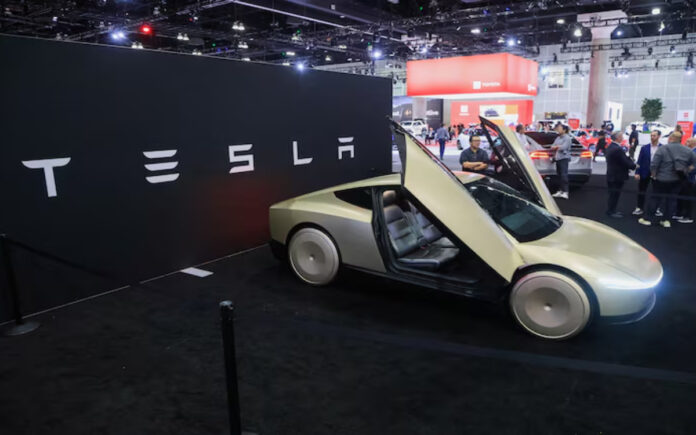Shanghai: Tesla’s ambitious plans to ship components from China for its Cybercab and Semi electric truck production in the U.S. have hit a roadblock following a sharp escalation in tariffs by President Donald Trump’s administration, according to a source with direct knowledge, as per media reports.
The move has raised significant concerns about potential delays to the mass production timeline of both models, which Tesla CEO Elon Musk has touted as transformative innovations expected to drive the next phase of growth for the electric vehicle (EV) maker.
While Tesla initially prepared to absorb the cost of the 34% tariff imposed on Chinese goods, the situation became untenable when the Trump administration raised the tariff to 84% on April 9, later increasing it further to 125%. The cumulative effect has pushed total tariffs on Chinese auto components bound for the U.S. to a staggering 145%, the source said, requesting anonymity due to the sensitivity of the information.
The production of the Cybercab is scheduled to take place in Texas, while the Semi trucks were slated for assembly in Nevada. The company had planned to begin receiving component shipments within months, aiming to start trial production in October and move into mass production in 2026. With shipments now suspended, the duration of the delay remains uncertain.
Over the past two years, Tesla has worked to reduce its dependency on Chinese suppliers by sourcing more parts from North America—a strategy designed to mitigate risks from evolving U.S. trade policy. This adjustment, however, has not fully shielded the company from the repercussions of the latest tariff hikes.
During a recent White House event, President Trump said he was reviewing the 25% tariffs on foreign autos and auto parts imported from countries like Mexico and Canada, adding: “They’re going to make ’em here,” noting car manufacturers would need time to adjust.
Tesla did not issue any official response despite multiple requests for comment, according to international news agency Reuters, which reported the company’s continued silence amid growing concerns over the production delays and tariff impacts.
As Tesla works to obtain state approvals for its proposed robotaxi service, which will feature a fleet of Cybercabs, uncertainty surrounding component shipments now clouds the company’s vision. The robotaxi, revealed in October as a steering wheel-free and pedal-free two-door model, is projected to begin production in 2026 with a target price under $30,000.
In parallel, Tesla also aims to significantly increase production of its Semi electric trucks starting in 2026, fulfilling long-delayed deliveries to major clients, including Pepsi.
Also Read | Trump Administration Restricts DOJ Employees’ Social Media Activity in New Policy Shift
The disruption illustrates the unintended consequences of Trump’s protectionist tariff policy, which, while intended to bolster U.S. manufacturing, is now impacting Elon Musk—one of the administration’s most high-profile supporters. Musk has consistently spoken out in favor of free trade and voiced opposition to tariffs on his social media platform X.
According to the Washington Post, Musk recently made a personal appeal to Trump to reconsider the sweeping global tariff hikes, emphasizing the complex nature of global supply chains by referencing a video about how making a pencil requires materials and expertise from around the world.
Also Read | Zuckerberg Feared Breakup: Instagram Spinoff Was on the Table
Meanwhile, Tesla has halted new orders for its Model S and Model X vehicles after China retaliated with its own 125% tariff on U.S.-made goods, further complicating the automaker’s global sales strategy.
According to an S&P report published in February, Chinese auto parts exports to the U.S. have accounted for approximately 15%-20% of their total export value in recent years—a figure now under threat due to escalating trade tensions.



